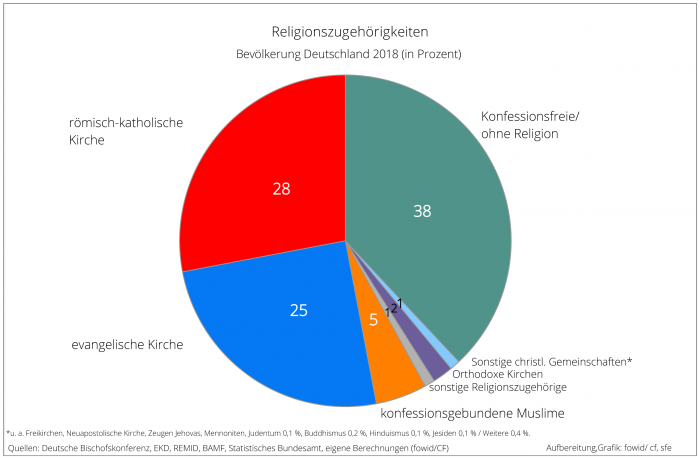Increasing numbers of non-denominational people, decreasing numbers of Catholics and Protestants
fowid publishes an overview on the distribution of "Religious affiliations 2018"
Even though the total German population increased by 280,000 persons in 2018, the Catholic Church lost about 300,000 members compared to the previous year, the Protestant Church as many as 400,000. The group of nondenominational people grew by more than 800,000 persons, the group of denominational Muslims by about 100,000 persons. This is the conclusion of the overview "Religions affiliations 2018", which was recently published on the website of the Research Group on Worldviews in Germany (fowid).
By the end of 2018, according to fowid, 38 percent of the population were nondenominational (rounded), 28 percent Catholics and 25 percent Protestants ("Protestants"). About 5 percent of the population belonged to the group of denominational Muslims, two percent to Christian Orthodox Churches, and one percent to other Christian groups, such as Christian Free Churches. The other religious communities (e.g. Judaism, Hinduism, Buddhism) together also accounted for one percent of the population.
The loss of members in the Protestant Church in Germany (EKD) roughly corresponded to the losses of the previous year (- 395,000 vs. - 394,000), but in the Roman Catholic Church it increased significantly compared to 2017 (-309,000 vs. -269,000 members). The higher decline among Catholics is primarily due to the 29 percent increase in church membership terminations (216,078 vs. 167,504). Apart from that, for both churches the number of deaths/burials is higher than the number of members leaving the church. As the number of baptisms decreases and the number of the deceased increases, the churches would still suffer membership losses even if there were no active church membership terminations.
Trend stable despite partially unclear figures
The general trend is therefore clear and stable: there will be more and more nondenominational people and fewer and fewer Catholics and Protestants in Germany in the coming years. Nevertheless, due to various structural problems, the figures of the religious overview can only be regarded as "more or less exact approximations to reality", as fowid director Carsten Frerk emphasizes in his analysis.
A particular problem remains with the information on the number of Muslims living in Germany who are religiously organised to a much lesser extent than Catholics or Protestants. In order to achieve a comparability of the figures, the Research Group on Worldviews in Germany has agreed to classify only those Muslims who describe themselves as religious as "denominational Muslims". The non-religious Muslims, who never attend religious events but continue to call themselves "Muslims" for reasons of tradition, lifestyle, etc., are accordingly assigned to the group of "cultural Muslims".
The proportion of these non-religious cultural Muslims can be seen, for instance, from the Federal Office for Migration and Refugees (BAMF) study "Muslimisches Leben in Deutschland (MLD 2008)" ("Muslim Life in Germany (MLD 2008)"). In this study - with variations depending on the countries of origin - a total of 29 percent of the interviewed Muslims stated that they never attended religious events, i.e. never went to the mosque. A study conducted by the Konrad-Adenauer-Stiftung in 2016 came to the conclusion that "a not inconsiderable proportion of Muslims living in Germany are relatively secular", as 36 per cent of the Muslims surveyed could not be assigned to any religious orientation of Islam. Taking these and other findings into account, fowid decided to consider 20 percent of Muslims as non-religious cultural Muslims and to exclude them from the total number of Muslims as nondenominational. (The same procedure could be applied - presumably with a higher percentage - to secular Jews who have departed as clearly from the Jewish religion as Freud or Einstein did before - while this group does not carry much weight in the population statistics, intellectually it does.)
Read the full analysis by Carsten Frerk in German on the website of the Research Group on Worldviews in Germany:
https://fowid.de/meldung/religionszugehoerigkeiten-2018

